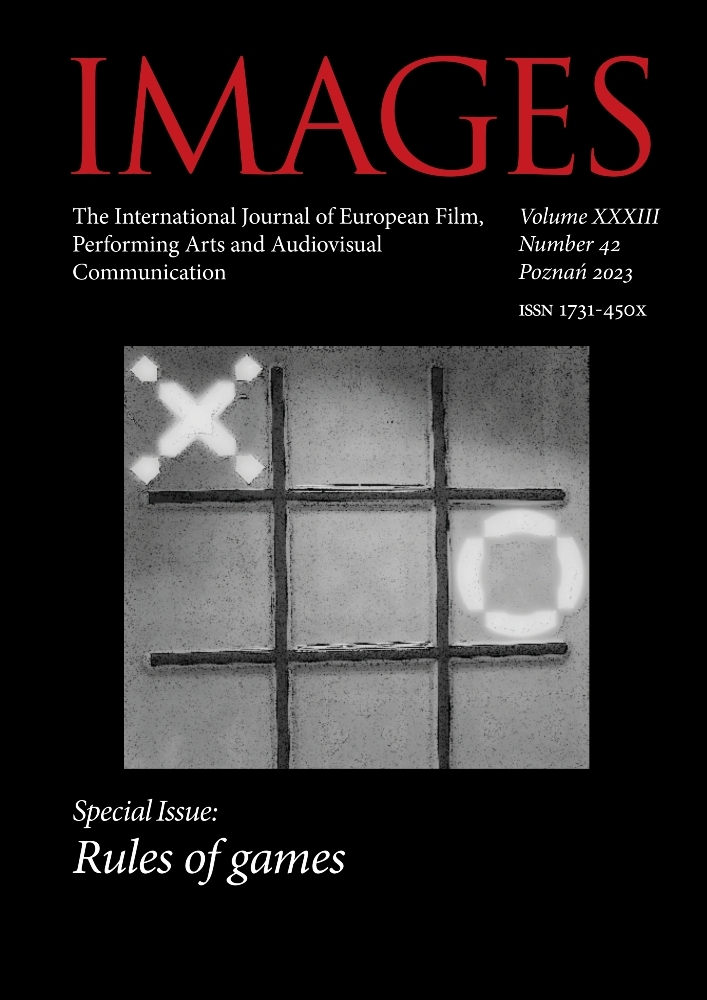Abstract
This article is an attempt to describe the ways in which the theme of time travel functions in video games. The text presents the two most common types of incorporating time travel into game mechanics. In the first type, an avatar has the ability to manipulate gameworld time. In the second case, time travel is simulated by a transfer of the avatar into a different game area. The article constitutes a step towards more advanced research on time travel in video games.
References
Adamczak M., Globalne Hollywood, filmowa Europa i polskie kino po 1989 roku. Przeobrażenia kultury audiowizualnej przełomu stuleci, Gdańsk 2010
Booker M.K., Drawn to Television: Prime-Time Animation from the Flintstones to Family Guy, Westport – Connecticut – London 2006
Butt M.-A.R., Dunne D., Rebel Girls and Consequence in Life Is Strange and The Walking Dead, „Games and Culture” 2017, nr 14(4), s. 430–449. DOI: https://doi.org/10.1177/1555412017744695
Cielecka M., Wieczne teraz? Analiza temporalności gier komputerowych, „Kwartalnik Filmowy” 2014, nr 86(146), s. 171–182
Fernández-Vara C., Shaping Player experience in adventure Games: history of the adventure Game Interface, [w:] Extending Experiences. Structure, Analysis and Design of Computer Game Player Experience, red. O.T. Leino, H.E. Wirman, F. Amyris, Rovaniemi 2008, s. 210–227
Gazzard A., Teleporters, Tunnels & Time: Understanding Warp Devices In Vi- deogames, Breaking New Ground: Innovation in Games, Play, Practice and Theory. Proceedings of DiGRA 2009 [online], https://discovery.ucl.ac.uk/id/eprint/1499996/1/906040.pdf (dostęp: 17.05.2023)
Kleinman E., Caro K., Zhu J., From immersion to metagaming: Understanding rewind mechanics in interactive storytelling, „Entertainment Computing” 2020, nr 33. DOI: https://doi.org/10.1016/j.entcom.2019.100322
Leś M.M., Fantastycznonaukowe podróże w czasie. Między logiką a emocjami, Białystok 2018
de Miranda L., Life Is Strange and “Games Are Made”: A Philosophical Interpretation of a Multiple-Choice Existential Simulator With Copilot Sartre, „Games and Culture” 2016, nr 13(8), s. 825–842. DOI: https://doi.org/10.1177/1555412016678713
Prajzner K., Narracja, [w:] Wprowadzenie do groznawstwa, red. K. Prajzner, Łódź 2019, s. 15–36
Sicart M., Defining Game Mechanics, „Game Studies. The International Journal of Computer Game Research” 2008, nr 8(2) [online], https://gamestudies.org/0802/articles/sicart (dostęp: 17.05.2023)
Wittenberg D., Time Travel: The Popular Philosophy of Narrative, New York 2013 DOI: https://doi.org/10.5422/fordham/9780823249961.001.0001
Zagal J.P., Mateas M., Time in Video Games: A Survey and Analysis, „Simulation & Gaming” 2010, nr 41(1), s. 1–25. DOI: https://doi.org/10.1177/1046878110375594
Achron (Hazardous Software Inc., 2011)
Adventure in Time (Paul Berker, 1981)
A New Beginning (Daedalic Entertainment, 2010)
Back to the Future: The Video Game (Telltale Games, 2010)
Back to the Future II & III (Beam Software, 1990)
Bill & Ted Excellent Adventure (Off The Wall Productions, 1989)
Blinx the Time Sweeper (Artoon, 2004)
Braid (Number None, Inc., 2008)
Chronology (Bedtime Digital Media, 2014)
Chronomaster (DreamForge Intertainment, 1995)
Chrono Trigger (Square, 1995)
Day of the Tentacle (LucasArts, 1993)
Empire Earth (Stainless Steel Studios, Mad Doc Software, 2001)
Final Fantasy (Square, 1987)
Forza Horizon 5 (Playground Games, 2021)
LEGO: Dimensions (Traveller’s Tales, 2015)
LEGO Harry Potter: Years 1–4 (Traveller’s Tales, 2010)
Life is Strange (Dontnod Entertainment, 2015)
No Time (Lost in Days Studio, w 2023 r. znajduje się w fazie wczesnego dostępu)
Original War (Altar Games, 2001)
Outer Wilds (Mobius Digital, 2019)
Pong (Atari, 1972)
Prince of Persia: Sands of Time (Ubisoft Montreal, 2003)
Quantum Break (Remedy Entertainment, 2016)
Singularity (Raven Software, 2010)
Sonic The Hedgehog (Sonic Team, 1991)
Sonic The Hedgehog CD (Sega, 1993)
Tick Tock Isle (Squiddershins, 2015)
Time-Gate (John Hollis, 1983)
The Elder Scrolls V: Skyrim (Bethesda Game Studios, 2011)
The Great Perhaps (Caligari Games, 2019)
The Legend of Zelda: Majora’s Mask (Nintendo EAD, 1999)
The Legend of Zelda: Ocarina of Time (Nintendo EAD, 1998)
TimeShift (Saber Interactive, 2007)
Yestermorow (Bitmap Galaxy, 2020)
Back to the Future (1985), reż. Robert Zemeckis
Bill & Ted’s Excellent Adventure (1989), reż. Stephen Herek
Doctor Who (1963–), BBC
Dzień świstaka (1993), reż. Harold Ramis
La Jetée (1962), reż. Chris Marker
Planet of the Apes (1968), reż. Franklin J. Schaffner
Star Trek: The Original Series (1966–1969)
The Flintstones (1960–1966), ABC
The Simpsons (1989–), FOX
The Terminator (1984), reż. James Cameron
The Time Bandits (1981), reż. Terry Gilliam
The Time Machine (1960), reż. George Pal
The Twilight Zone (1959–1964), CBS
License
Copyright (c) 2023 Krzysztof Czyżak

This work is licensed under a Creative Commons Attribution 4.0 International License.

